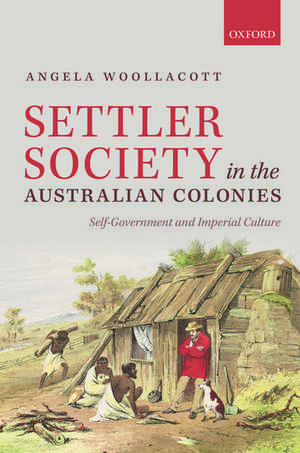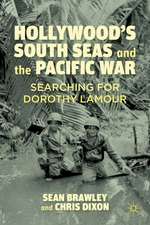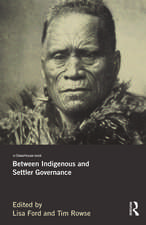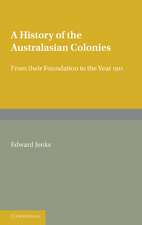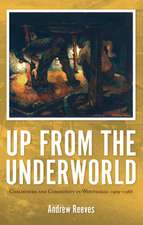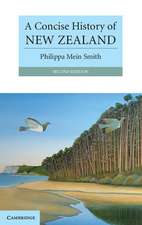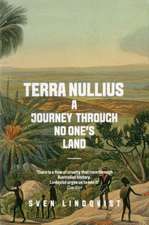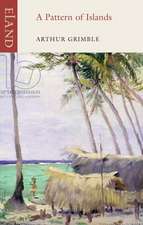Settler Society in the Australian Colonies: Self-Government and Imperial Culture
Autor Angela Woollacotten Limba Engleză Hardback – 5 mar 2015
Preț: 700.48 lei
Preț vechi: 1006.85 lei
-30% Nou
Puncte Express: 1051
Preț estimativ în valută:
134.04€ • 143.33$ • 111.76£
134.04€ • 143.33$ • 111.76£
Carte tipărită la comandă
Livrare economică 07-14 aprilie
Preluare comenzi: 021 569.72.76
Specificații
ISBN-13: 9780199641802
ISBN-10: 0199641803
Pagini: 240
Ilustrații: 20 black and white illustrations
Dimensiuni: 163 x 241 x 19 mm
Greutate: 0.51 kg
Editura: OUP OXFORD
Colecția OUP Oxford
Locul publicării:Oxford, United Kingdom
ISBN-10: 0199641803
Pagini: 240
Ilustrații: 20 black and white illustrations
Dimensiuni: 163 x 241 x 19 mm
Greutate: 0.51 kg
Editura: OUP OXFORD
Colecția OUP Oxford
Locul publicării:Oxford, United Kingdom
Recenzii
With considerable authority, Angela Woollacott's Settler Society in the Australian Colonies points the way for a new generation ... the book is a concise, useful, fresh, and often original summary of a vast and difficult topic
[This book] is a sketch of Australia but an entirely new and challenging one ... Angela Woollacott makes us glance nervously and desperately about ourselves. She is unravelling our most cherished ideas. This book should be controversial. It needs to be, and we must make it so.
[a] capacious and original work ... Woollacott shows she is in the vanguard of a wave of Australian historians who are attempting to connect Indigenous dispossession, gender relations and settler politics.
[Angela Woollacott] has brought the Australian experience into the mainstream of settler colonial studies ... Woollacott has written a stimulating and thought-provoking study of the nature and dynamics of settler colonialism in the southern colonies. It sets an agenda for new research and will prompt historians to re-examine many of their assumptions about colonial society in Australia.
Woollacott writes an ambitiously integrated history. She stitches microhistories of individuals and families across a broad canvas of British imperial expansion. She draws connections between political, cultural, social, and intimate aspects of Australian settler society. She weaves questions of gender into what is conventionally told as a masculine political story of self-government. And she ties local histories of settler-indigenous relations to a global history of settler colonialism.
This is a new history of an old topic, and one that offers rich, interwoven arguments that draw from many historiographical areas: gender history, the history of colonialism, Australian political history and global history. Readers coming from all directions will find much of value. Woollacott shows convincingly how interrelated discourses of race, gender and the imagined relationship between the colony and the metropole shaped the Australian colonies and, just as importantly, how these discourses can be fully understood only if they are seen as inherently transnational.
[This book] is a sketch of Australia but an entirely new and challenging one ... Angela Woollacott makes us glance nervously and desperately about ourselves. She is unravelling our most cherished ideas. This book should be controversial. It needs to be, and we must make it so.
[a] capacious and original work ... Woollacott shows she is in the vanguard of a wave of Australian historians who are attempting to connect Indigenous dispossession, gender relations and settler politics.
[Angela Woollacott] has brought the Australian experience into the mainstream of settler colonial studies ... Woollacott has written a stimulating and thought-provoking study of the nature and dynamics of settler colonialism in the southern colonies. It sets an agenda for new research and will prompt historians to re-examine many of their assumptions about colonial society in Australia.
Woollacott writes an ambitiously integrated history. She stitches microhistories of individuals and families across a broad canvas of British imperial expansion. She draws connections between political, cultural, social, and intimate aspects of Australian settler society. She weaves questions of gender into what is conventionally told as a masculine political story of self-government. And she ties local histories of settler-indigenous relations to a global history of settler colonialism.
This is a new history of an old topic, and one that offers rich, interwoven arguments that draw from many historiographical areas: gender history, the history of colonialism, Australian political history and global history. Readers coming from all directions will find much of value. Woollacott shows convincingly how interrelated discourses of race, gender and the imagined relationship between the colony and the metropole shaped the Australian colonies and, just as importantly, how these discourses can be fully understood only if they are seen as inherently transnational.
Notă biografică
Angela Woollacott teaches and supervises in the fields of Australian and British Empire history, gender, settler colonialism, transnational history, and biography. Her books include On Her Their Lives Depend: Munitions Workers in the Great War (1994); To Try Her Fortune in London: Australian Women, Colonialism and Modernity (2001); Gender and Empire (2006); and Race and the Modern Exotic: Three 'Australian' Women on Global Display (2011).
